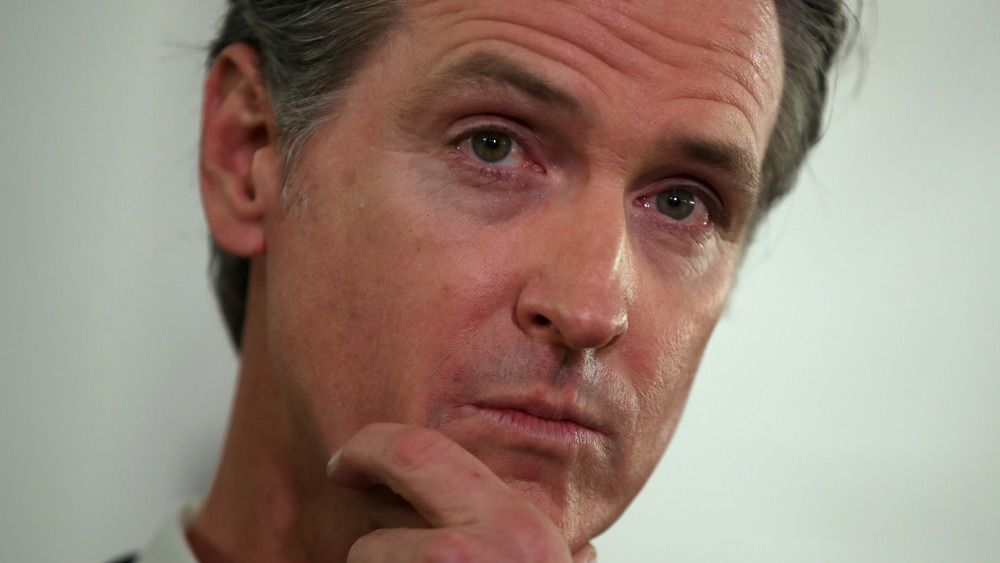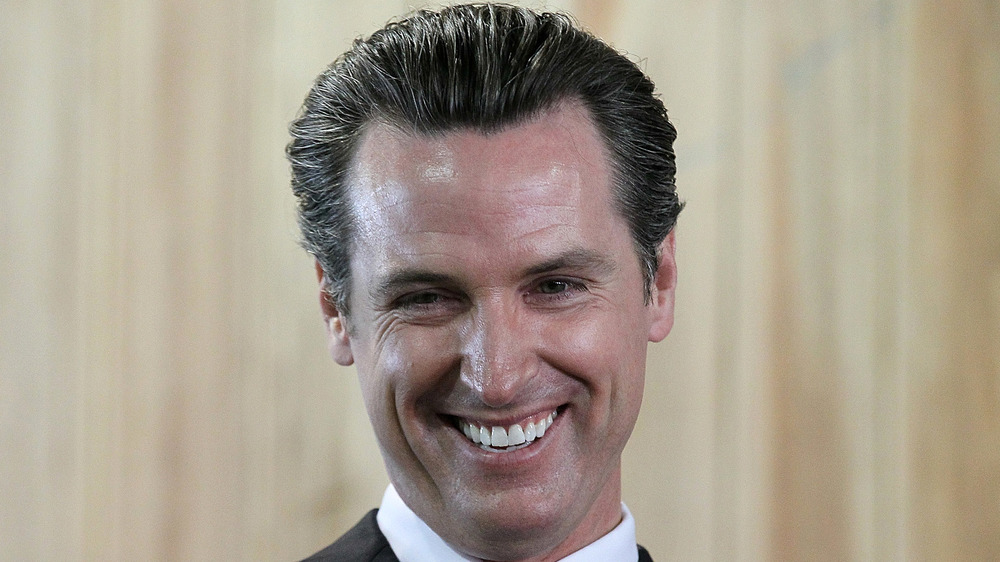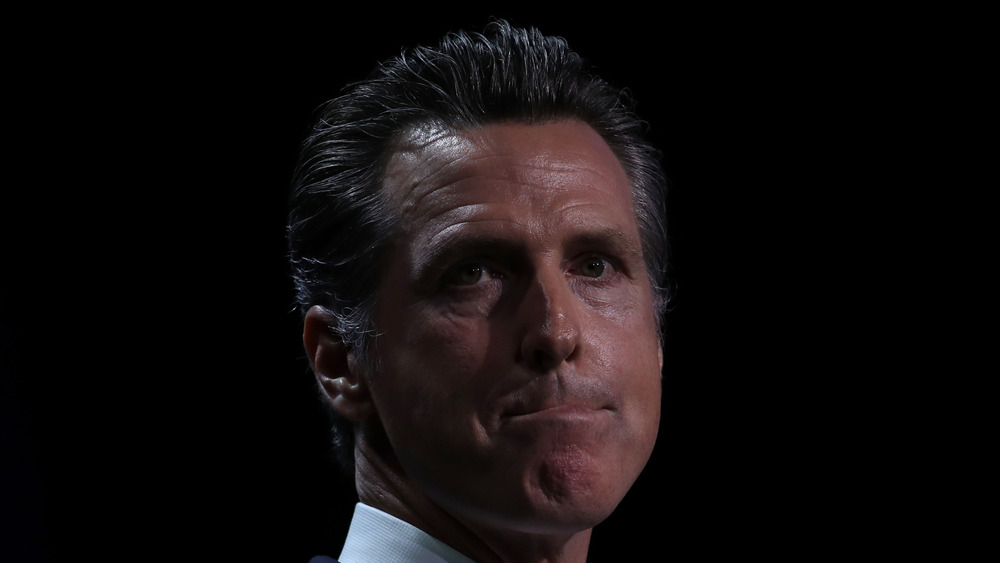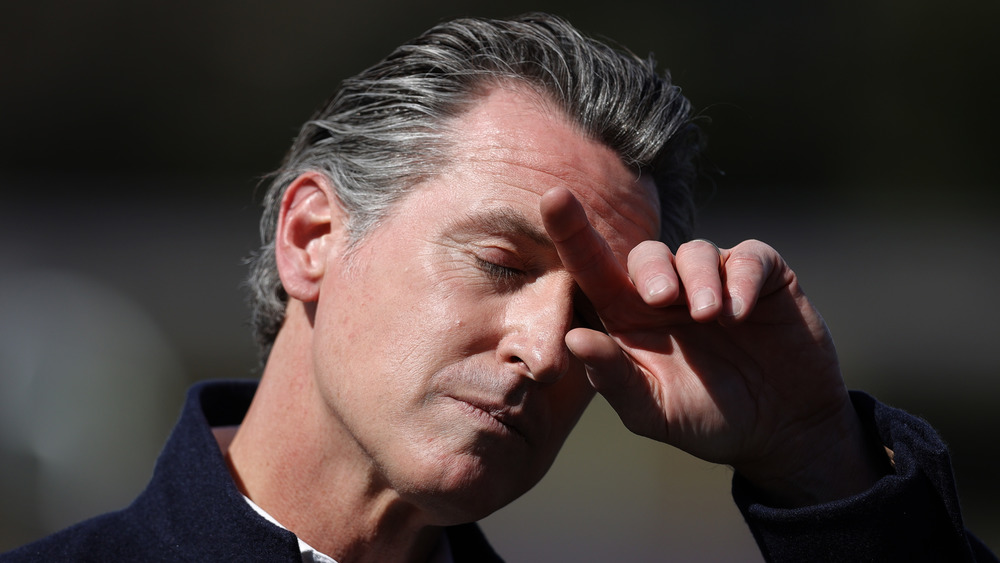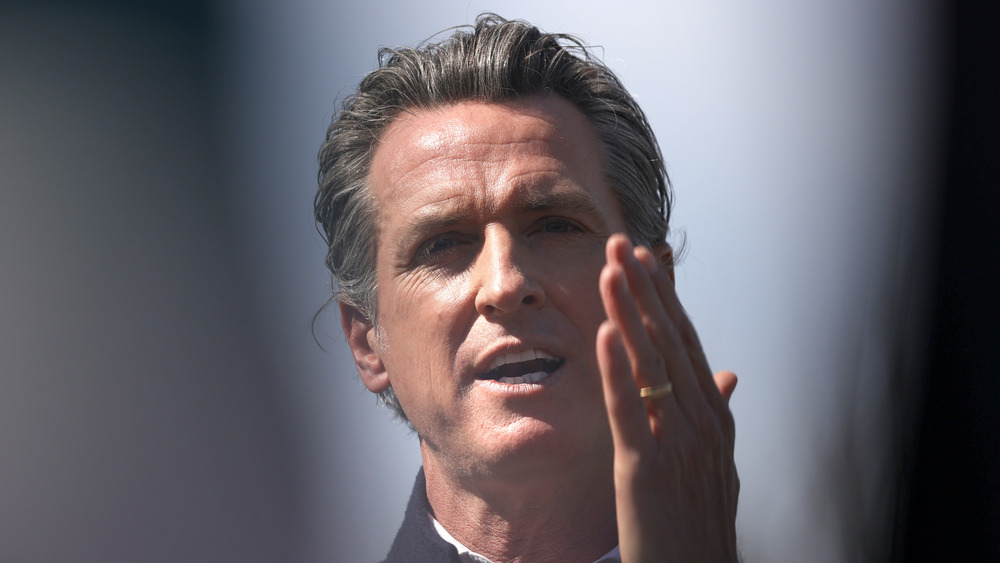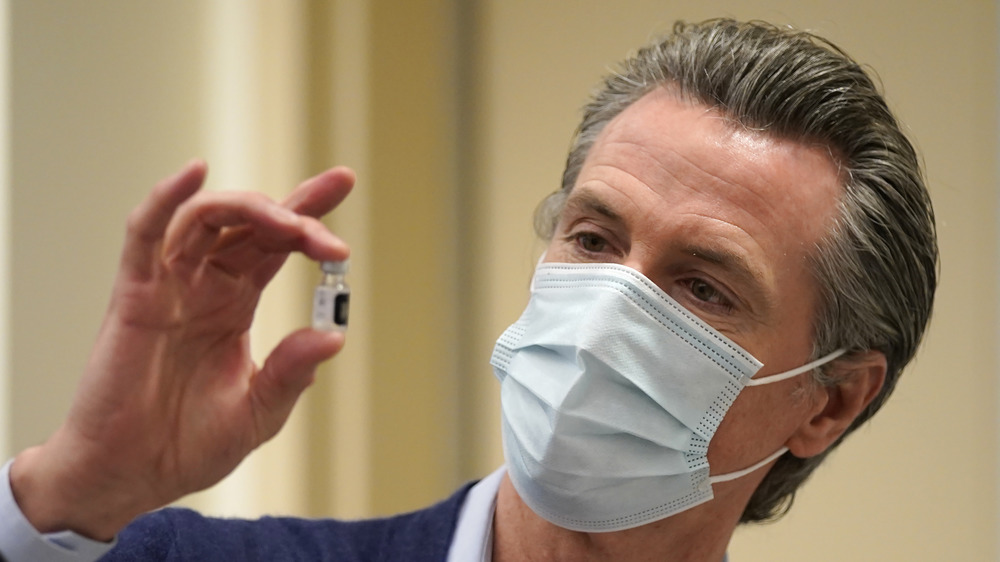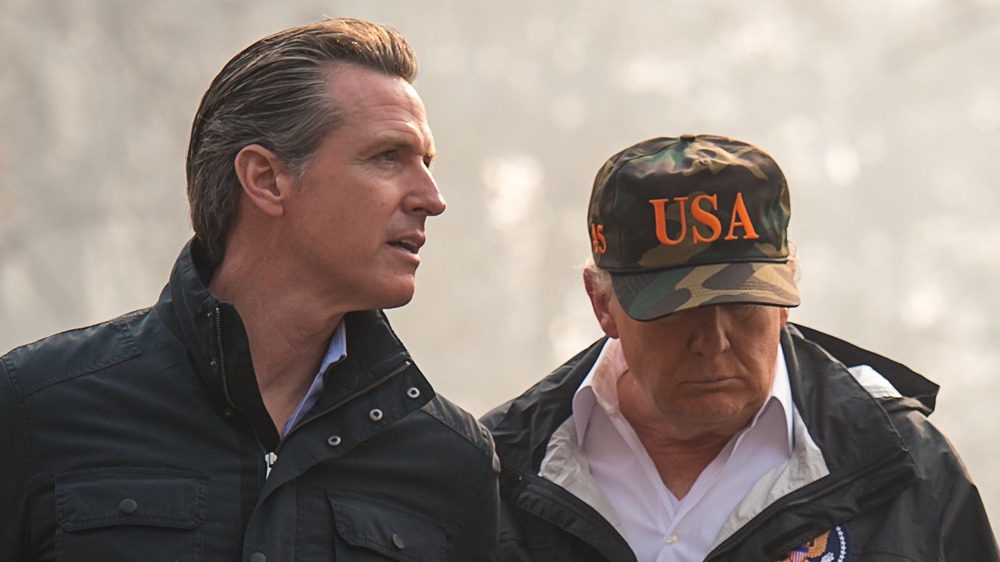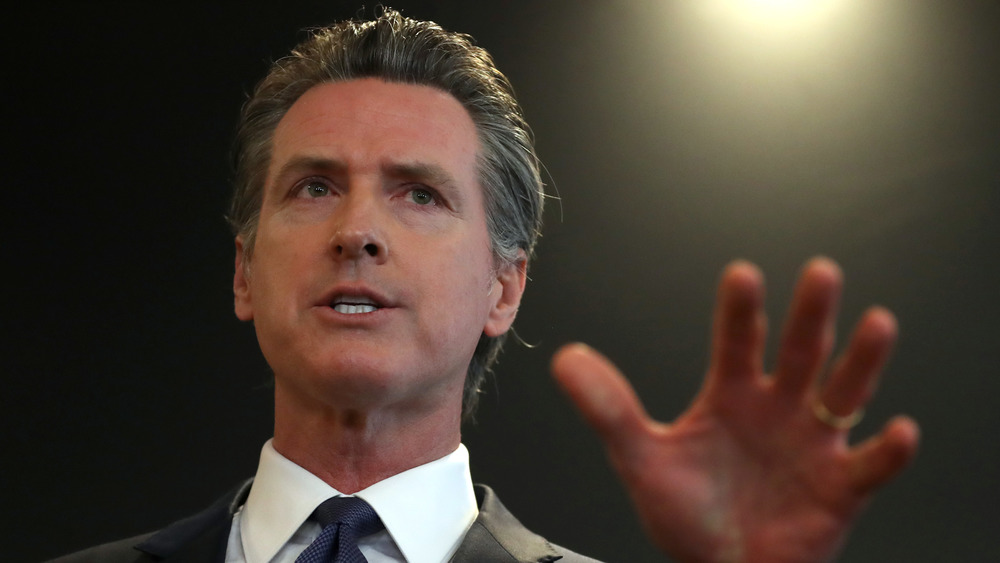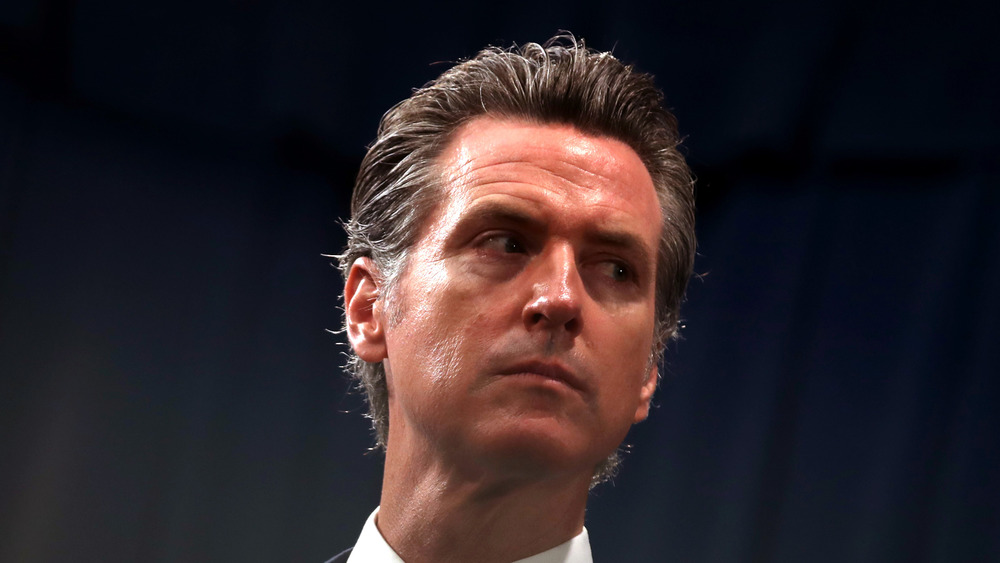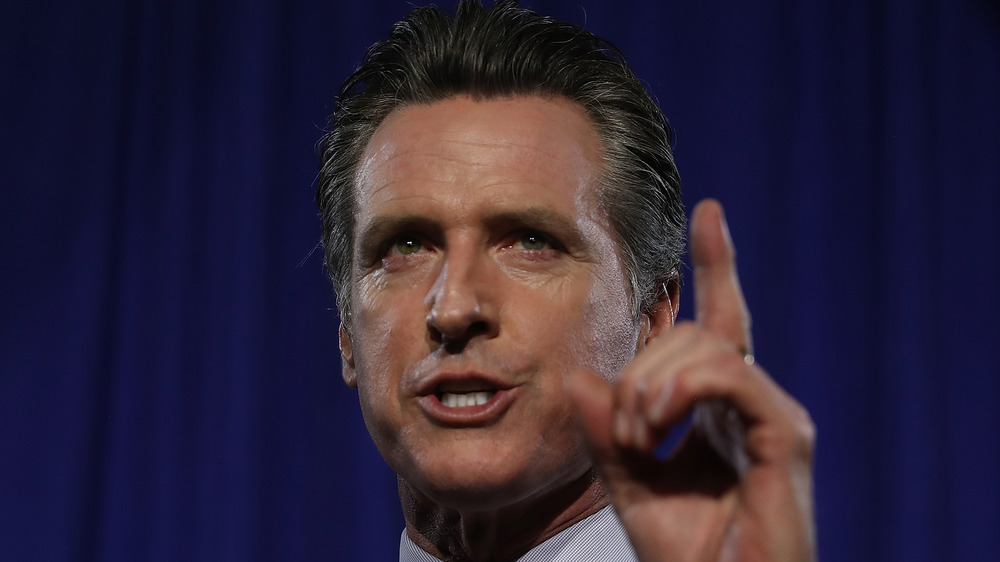The Double Life Of Governor Gavin Newsom
If a caped and cowled vigilante crime fighter had been spotted skittering across San Francisco rooftops any time in the late aughts, you could be forgiven for wondering if then-Golden Gate City Mayor Gavin Newsom was, in fact, Batman. As the old saying goes, Republicans fall in line, and Democrats fall in love, and the latter were certainly in full-on swoon mode for this young Bruce Wayne-level dashing city leader.
But of course, Newsom is not a superhero. There isn't actually a secret identity. Well-coiffed though he is, he's just a politician who was later elected aa Governor of California in 2018. Along with that high office — leading America's most populous and perhaps culturally influential state — came a whole new level of scrutiny. Almost as soon as Newsom took the oath to uphold CA's constitution, his conservative constituents began using that same document for a proposal to oust him. As things stand in 2021, he might not end the year in office. His enemies have some ammo, too: There's been boozy nights, a juicy sex scandal, and a case of COVID lockdown hypocrisy, meaning Newsom's presidential ambitions might also be all but snuffed out ... or maybe not. Politics isn't exactly a simple game to predict.
Still, Gavin Newsom might not be the metaphorical masked hero his early supporters had hoped, and as this pretty pol's poll numbers slip, his tenuous grasp over a state bitterly divided is genuinely in question.
Gavin Newsom violated his own COVID lockdown rules
COVID rules are for thee, not for me, implied Gavin Newsom as he dug into his entrée at the $350 a plate Michelin-rated restaurant, French Laundry, in California's natty Napa Valley. At least, that was the message Newsom appeared to send on Nov. 6, 2020, during the height of California's restrictive and controversial COVID-19 lockdowns — and amidst the governor's decrees that families forgo their own Thanksgiving traditions.
Newsom was the United States' first state leader to establish stay-at-home orders, according to CNN. But while everyone else was huddled inside, battling loneliness and economic anxiety, California's top pol was attending the 50th birthday party of a political lobbyist. Newsom initially claimed the meal was outdoors, but photos captured by Fox 11 proved it was an indoor event where the California native was seated at a table for at least 12 well-heeled pals. Reporter Adam Housley further claimed via Twitter there may have been as many as 22 patrons in this party, which allegedly racked up $15,000 in charges at the bar alone. He also alleged that Newsom's group was "so loud" that "other patrons complained" and were "privately laughing at the controversy."
Publicly though, Newsom regretted the incident. "I want to apologize to you because I need to preach and practice, not just preach and not practice, and I've done my best to do that," he explained, according to the Los Angeles Times. "We're all human. We all fall short sometimes."
Inside the governor's affair with the wife of his closest advisor
Nothing says double life like two-timing the people you trust most. Back in 2007, then-Mayor Gavin Newsom began an affair with his chief campaign advisor's wife, Ruby Rippey-Tourk, according to Politico. Newsom was separated from his first wife at the time, future Fox News host Kimberly Guilfoyle, so there was no infidelity on his part, but the scandal did wreck the marriage of his top aide, Alex Tourk, who promptly resigned from the campaign when the news broke.
The other problem? Rippey-Tourk (now Rippey-Gibney) was Newsom's appointment secretary at the time. She later said the affair "destroyed her home life," as the Los Angeles Times put it, but didn't consider it a #MeToo incident. "I fully support the #metoo movement. In this particular instance, however, I am doubtful that it applies," she wrote on Facebook in 2018. "Yes, I was a subordinate, but I was also a free-thinking, 33-yr old adult married woman & mother. (I also happened to have an unfortunate inclination towards drinking-to-excess & self-destruction."
Alex Tourk has also moved on and is still an influential San Francisco wheeler and dealer. When asked for his thoughts on Newsom following the affair, the strategist simply told SFGate, "My resignation speaks for itself." For his part, Newsom reflected on the scandal over a decade later, saying in part (via Politico), "I acknowledged it. I apologized for it. I learned an enormous amount from it."
Gavin Newsom's trouble with alcohol
Gavin Newsom's lover, Ruby Rippey-Tourk, admitted that excessive alcohol consumption was part of the cocktail that led her into the then-mayor's arms — and the ruination of her marriage. At the time, Newsom was also known to imbibe. While dealing with the pressure of running one of America's most affluent and innovative cities at only 39, The Sacramento Bee reported that "a close personal friend and counselor to Newsom said that he'd spiraled out of control and was 'self-sabotaging.'"
Newsom also dropped a statement after the 2007 affair revelation. "Upon reflection with friends and family this weekend, I have come to the conclusion that I will be a better person without alcohol in my life," he stated, according to the San Francisco Chronicle. He purportedly abstained from alcohol for a while, but now enjoys the occasional glass of wine.
However, the California governor later disputed reports that he'd attended rehab, explaining to the Bee in 2018 — in a moment of quasi candor, for a nationally famous politician — that his friend, an addiction clinic CEO named Mimi Silbert, intervened in his drinking in the late aughts. Newsom said that Silbert personally vowed to spend every night with him until he was recovered, but noted that "there was no treatment, no nothing related to that stuff." Counseled by an addiction professional in private, Newsom claimed that he "stopped [drinking] because [he] thought it was a good thing to stop."
If you or someone you know is struggling with substance abuse and mental health, please contact SAMHSA's 24-hour National Helpline at 1-800-662-HELP (4357).
The California governor and the divided state that wants him gone
California is the bluest of blue states — and we don't mean just the Pacific. It's also a state with internal political divisions that mirror the rest of America: progressive urban centers pitted against solidly conservative rural ones. Gavin Newsom has long been considered a rising star in the Democratic party, but Golden State conservatives positively loathe the guy and have made six attempts to recall his election in his short time in office, which began in 2018.
The first five efforts failed, but Newsom's strict COVID lockdown measures were so unpopular that the recall vote appeared to be a real threat by March 2021, according to USA Today. Newsom, not one to roll over, vowed, "Well, the reality is it looks like it's going on the ballot, and so we're ready to go. We will fight it. We will defeat it."
Polling at this time suggested this could be a close call for the well-quaffed governor. According to The Hill, 86 percent of Republicans in the state wanted him out, and his support among registered Democrats wasn't super strong either, landing at just 66 percent. He did have one ace up his sleeve though: Getty money. The legendary California oil dynasty donated at least $500,000 to his various campaigns and was just one among Newsom's big-money backers who liked the cut of his jib, according to the Daily Mail. Politics is an expensive business, and Newsom has friends in high places, so we wouldn't count him out yet.
Gavin Newsom's companies cashed in on COVID-19
A lot of politicians moonlight as business tycoons. You may have heard rumblings of former POTUS Donald Trump's various ventures outside the White House. And, in fact, when he's not shaking hands and kissing babies, California Governor Gavin Newsom has had his own surprisingly vast money-making machine, too.
As of this writing, Newsom partially owns an oddly named entity called PlumpJack Group with stakes in bars, restaurants, and wineries — which, as an aside, means his strict COVID lockdown policies probably hurt him, too. When the Gavinator became Governor in 2018, he "placed his ownership interests ... into a blind trust, according to ABC 7 News, but it was then revealed that this PlumpJack Group got almost $3 million in so-called PPP loans — low-interest federal funds designed mostly to pay employee salaries in small businesses struggling with pandemic losses.
Nothing illegal is even alleged here, but sometimes in politics, the appearance of corruption is just as important as the facts. The Los Angeles Times wrote in 2018 that Newsom's business group had made his family tremendously wealthy, noting that "his partial ownership of the company raises the same conflict-of-interest red flags that continue to surround Donald Trump's presidency." The heavy haul of COVID cash raised further questions, as Newsom's winery somehow got their hands on more money than any other winery in the state, "despite having a mere 14 employees," according to SFist.
The politician's two views of Donald Trump
One of Gavin Newsom's strongest political moments might have been his frankness surrounding the California wildfires of 2020. If you don't recall this particular apocalyptic horror of that year, the state was ablaze to the tune of $13 billion in damages, according to Reuters. Newsom took responsibility for the issue, but also stuck to his guns on climate change, defying some critics who would've rather seen him blast then-President Donald Trump.
Newsom and Trump's relationship started off rocky. The governor slammed the then-POTUS in 2018, calling him "a pathetic disgrace" via Twitter over The Donald's decision to take the White House flag to full-staff 48 hours after rival John McCain's death. But when Newsom's state was in trouble, he took a more pragmatic attitude. In a face-to-masked-face meeting, the governor "blasted" Trump for his failure to act on climate change, per the Los Angeles Times, but also acknowledged California's serious failures of forest management and thanked the then-president for "record" federal support.
"We can agree to disagree," Newsom said, adding (via The Hill), "I want to thank you and acknowledge the work that you've done." Newsom summarized this refreshingly statesmanlike view to The San Diego Tribune in 2018: "Issue by issue, I don't wake up every day thinking about Donald Trump, but he seems to think about this state as a punching bag ... you can capitulate or you can push back. I prefer the pushback, but when he's right, he's right."
Gavin Newsom has granted clemency to murderers
Criminal justice reform is all the rage in Gavin Newsom's Democratic party, and one of the key issues is prison reform — specifically, reducing sentences for non-violent offenders. But some Californians were left scratching their heads when Newsom issued a series of pardons that included several convicted murderers, contravening the wishes of prosecutors and victims' families.
In 2019, for example, Newsom commuted the sentence of Marcus McJimpson, who was serving a double life sentence. In 1988, a 21-year-old McJimpson was out on bail for yet another "similar shooting," according to The Fresno Bee, when he gunned down two men in a parking lot. Newsom pardoned McJimpson after the convict started a dog training program in the pen, leaving him "eligible for a parole hearing." Prosecutors were outraged, writing, "McJimpson shot ... two men in their early twenties. When one did not die fast enough for him, McJimpson ran him over with his car. He is a cold and calculating murder." Several other convicted killers made Newsom's 2019 clemency list, and he granted 22 more pardons the following year.
Newsom was criticized from the other side of this issue though, too, when he rejected a pardon for one of Charles Manson's cult killers, Leslie Van Houten. Newsday slammed the governor's reasoning for keeping Van Houten, now in her 70s, locked up as a "dishonesty," and dubbed his pardons as "crony clemency." You can't please everyone.
Is he 'ignoring' the will of the voters?
Representative Democracy is a funny thing. It has the word democracy right there — but that little modifier can create a lot of tension. That's especially true in California, where government has a heavy hand, but also often utilizes a referendum system, putting laws on the ballot like in a direct democracy.
This tension has played out most clearly in CA over the state's death penalty debate. Denizens of the state have twice voted to keep capital punishment on the books, and pulled the lever "in 2016 to expedite executions," according to the Los Angeles Times. However, in 2019, Governor Gavin Newsom seemingly ignored the will of his constituents and declared, via executive fiat, a "moratorium" on executions — also going back on an election promise.
The Los Angeles Times described Newsom's alleged overreach as a kind of slippery slope that could shatter faith in government, writing, "If a powerful elected official were perceived as two-faced with his word and dismissive of the voters' desires, he'd be headed for the political cliff." The state capital's paper of record, The Sacramento Bee (via the Los Angeles Times) put an even finer stinger on it: "The governor's lack of principle and failure to keep his promise is a slap in the face to survivors of heinous murders ... There is no excuse for governing by edict just because a leader doesn't like what voters have said."
The truth about Gavin Newsom's beef with Elon Musk
Of all the bromances that didn't pan out, the tale of Gavin Newsom and Elon Musk might leave the biggest hole in our hearts. But the truth is, these two never had a chance.
The feud began in May 2020, when Musk started operating his Tesla factory in contravention of local COVID ordinances. He tweeted, "Tesla is restarting production today against Alameda County rules. I will be on the line with everyone else. If anyone is arrested, I ask that it only be me." Musk also threatened a lawsuit, alleging there was "no rational basis" for the shut down of his company, according to CNBC. The back-and-forth escalated, with Musk even calling the restrictions "fascist" at one point and claiming he was moving his company to Nevada and Texas.
This is where Newsom stepped in. "I'm also not worried about Elon leaving anytime soon," the pol told Fast Money days later (via CNBC). "I've had a lot of conversations with him, and we're committed to the success and the innovation and the low-carbon, green growth economy that he's been promoting for decades and the state of California is accelerating in."
Of course, Newsom was wrong. Musk moved Tesla to Austin by December 2020, according to The Wall Street Journal. The move left California without potentially billions in future tax revenue from Tesla operations, not to mention from Musk himself, who's fluctuated between the richest and second richest human on Earth.

